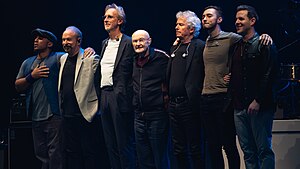Genesis | |
|---|---|
 Genesis final concert bow in 2022 (L–R): Daniel Pearce, Daryl Stuermer, Mike Rutherford, Phil Collins, Tony Banks, Nic Collins and Patrick Smyth | |
| Background information | |
| Origin | Godalming, Surrey, England |
| Genres | |
| Discography | Genesis discography |
| Years active |
|
| Labels | |
| Spinoffs | |
| Spinoff of | |
| Past members | |
| Website | genesis-music.com |
Genesis were an English rock band formed at Charterhouse School, Godalming, Surrey, in 1967. The band's longest-existing and most commercially successful line-up consisted of keyboardist Tony Banks, bassist/guitarist Mike Rutherford and drummer/singer Phil Collins. In the 1970s, during which the band also included singer Peter Gabriel and guitarist Steve Hackett, Genesis were among the pioneers of progressive rock.
The group were formed by five Charterhouse pupils, including Banks, Rutherford, Gabriel and guitarist Anthony Phillips, and named by former Charterhouse pupil and pop impresario Jonathan King, who arranged for them to record several singles and their debut album From Genesis to Revelation in 1969. After splitting from King, the band began touring, signed with Charisma Records and became a progressive rock band on Trespass (1970). Phillips departed after the album's recording, with Banks, Rutherford and Gabriel recruiting Collins and Hackett before recording Nursery Cryme (1971). Their live shows began to feature Gabriel's theatrical costumes and performances. Foxtrot (1972) was their first charting album in the UK and Selling England by the Pound (1973) reached number three, featuring their first UK hit "I Know What I Like (In Your Wardrobe)". The concept album The Lamb Lies Down on Broadway (1974) was promoted with a transatlantic tour and an elaborate stage show, before Gabriel left the group.
Collins took over as lead singer, and as a four-piece the group released A Trick of the Tail and Wind & Wuthering (both 1976) with continued success. Hackett left Genesis in 1977, reducing the band to a three-piece of Banks, Rutherford and Collins. Their ninth studio album, ...And Then There Were Three... (1978), contained the band's first major hit "Follow You Follow Me". Their next five studio albums – Duke (1980), Abacab (1981), Genesis (1983), Invisible Touch (1986) and We Can't Dance (1991) – were also successful. Collins left Genesis in 1996, and Banks and Rutherford replaced him with singer Ray Wilson, who appeared on their final studio album Calling All Stations (1997). The disappointing commercial and critical reaction to the album led the group to disband. Banks, Rutherford and Collins reunited for the Turn It On Again Tour in 2007 and again in 2021 for The Last Domino? Tour.
With between 100 million and 150 million albums sold worldwide, Genesis are one of the world's best-selling music artists. Their discography includes 15 studio and 6 live albums. They have won numerous awards (including a Grammy Award for Best Concept Music Video with "Land of Confusion") and have inspired a number of tribute bands recreating Genesis shows from various stages of the band's career. In 2010, Genesis were inducted into the Rock and Roll Hall of Fame.
- ^ a b Buckley 2003, p. 422.
- ^ Bowler & Dray 1992, p. x.
- ^ Reed, Ryan (10 October 2014). "20 Insanely Great Genesis Songs Only Hardcore Fans Know". Rolling Stone. Archived from the original on 1 October 2007. Retrieved 17 October 2019.
- ^ Breithaupt, Don; Breithaupt, Jeff (2000), Night Moves: Pop Music in the Late '70s, St. Martin's Press, pp. 68–69, ISBN 978-0-312-19821-3, archived from the original on 13 January 2023, retrieved 28 July 2016
- ^ "Former Genesis front man Peter Gabriel backs Catalunya protest movement". thinkSPAIN. Archived from the original on 15 March 2020. Retrieved 11 May 2019.